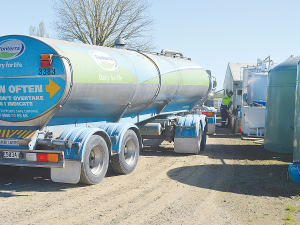Battle for milk
OPINION: Fonterra may be on the verge of selling its consumer business in New Zealand, but the co-operative is not keen on giving any ground to its competitors in the country.
 At Fonterra’s annual general meeting this month, the board and management expressed confidence in its revised strategy and the potential to create further value for shareholders.
At Fonterra’s annual general meeting this month, the board and management expressed confidence in its revised strategy and the potential to create further value for shareholders.
OPINION: What a difference a year can make.
Twelve months ago, Fonterra shares plummeted to $2 on the New Zealand Stock Exchange.
Compare that to seven years ago, when it was hovering around $6.50. Last week, shares were trading around $4.50. In the last financial year, Fonterra’s market capitalisation is up $4.3 billion to $7.7 billion.
The shift in share price reflects performance, and the returning confidence farmers have in Fonterra. And credit for this must go to Fonterra’s management team and staff.
It’s been a tough few years for the co-op’s farmer shareholders. Rising costs, interest rates and below par milk price have been taken a toll on dairy farming.
Thankfully, on-farm costs are easing and a potential $10 milk price on the cards this season means many farmers will be either breaking even or making a profit after a tough period. For these farmers, a rejuvenated co-op with a healthy share price puts the icing on the cake.
At Fonterra’s annual general meeting this month, the board and management expressed confidence in its revised strategy and the potential to create further value for shareholders.
The co-op has lifted its target average return on capital to 10-12%, up from 9-10%. There’s also a commitment to return more of the co-op’s earnings to shareholders, with an enhanced dividend policy of 60-80% of earnings, up from 40-60%. And the co-op is committed to maintaining the highest sustainable farmgate milk price.
With the co-op in a healthy state and the farmgate milk price heading towards $10, there’s renewed confidence among farmer shareholders. They can say Fonterra is in a strong position today and has a strong future.
Tickets are now available for Beef + Lamb New Zealand’s (B+LNZ) Out the Gate, returning from 19-21 May 2026 at Te Pae, Christchurch.
Dairy Women's Network (DWN) is welcoming AgriHealth as a new partner.
Northland Field Days patron Ross Newlove remembers the inaugural field days he attended 40 years ago.
Southland farmer Murray Donald has been appointed as chair of Safer Farms, the industry-led organisation focused on reducing harm, injuries and fatalities in the agricultural sector.
National Lamb Day returns this Sunday, 15 February, with Beef + Lamb New Zealand Inc calling on Kiwis to fire up their barbecues and celebrate the people and the product that put New Zealand on the world map.
When it comes to arranging the sound system at Northland Field Days, no one does it better than Colin Finlayson.
OPINION: Fonterra may be on the verge of selling its consumer business in New Zealand, but the co-operative is not…
OPINION: What does the birth rate in China have to do with stock trading? Just ask a2 Milk Company.